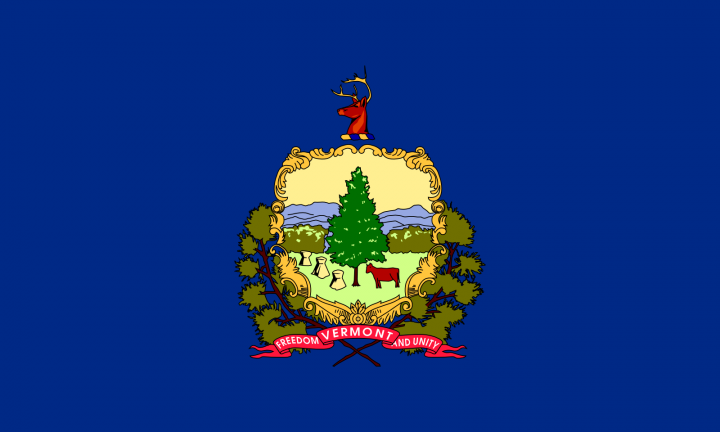How to Become an Ordained Minister in Vermont
If you haven't yet become ordained with the Universal Life Church, that is the first step. Anyone willing can become a legal minister of the ULC, one of the world's largest religious organizations. Online ordination is fast, easy, and completely free. Once you have your minister license, you'll be eligible to officiate a wedding. To become a minister, start by clicking the button below!
Video Walkthrough: Performing a Wedding in Vermont
Having made your way through the full wedding guide, officiating a wedding in Vermont is in your future! We get it – that was a lot of text to absorb. Did you know we have a full video series on how to get ordained to officiate a wedding in each state? Check out the video guide for performing a wedding in Vermont below!
How to Officiate a Wedding in Vermont
Before officiating a wedding in Vermont, your first step is to contact the City or Town Clerk’s office where the ceremony will be held. Let them know you’re an ordained minister planning to perform a wedding ceremony and ask what documentation they might need to see from you. You may be asked to show proof of your ordination or other materials to confirm you're authorized to officiate weddings. Since requirements can vary by location, it's a good idea to check in advance.
Select your city to view contact information for each office:
Legal residents of Vermont are not typically required to register prior to performing a wedding ceremony. If you’re not a Vermont resident, you may also need to register with the state before officiating. During that process, you may be asked to present a number of documents to verify your legal ordination status before you will be given permission to perform any wedding ceremonies. ULC ministers who live out of state and plan to solemnize a wedding in Vermont should review the forms linked below.
Vermont Petition for Non-Resident to Perform Marriage Ceremony
Vermont Petition for Non-Resident Minister Authorization
Regardless of what steps are required of you, any additional documents or supplies you might need can be found in the Ministry Supplies section right here on our site.
Officiant Requirements in Vermont

The Vermont state flower, the Red Clover
Once you've determined what you need, simply log in to your account and order the materials from our online catalog. We usually advise our ministers in Vermont to get a Classic Wedding Kit, especially they'll be officiating their first ceremony. We recommend placing your order well in advance of the wedding to avoid complications.
How to Get a Vermont Marriage License
As a minister, you should be aware of the existing marriage laws in Vermont. For example, if the couple plans to get a Burlington County marriage license, you should double-check that they understand how marriage licenses work in Vermont. In this state, the license is valid for 60 days. There is no waiting period between the time it is picked up, and when the ceremony can be legally performed. Lastly, the signed marriage license must be returned to the issuing office within 10 days of the ceremony.
How to Perform a Wedding
Congratulations! You're all set to officiate a wedding. If you could use a little guidance on the officiating process, the resources below are here to support you. Created specifically for ULC ministers, they’re full of useful tips, ideas, and inspiration for every stage of the ceremony. Whether you're celebrating a loved one’s big day or exploring a new path, these tools will help you deliver a ceremony that’s heartfelt and unforgettable. (Bonus: many ULC ministers got their start with these same resources!)
Finalizing the Marriage
After you perform the ceremony, you will sign the marriage license along with the couple and their two witnesses. Your title is 'minister', the ceremony type is 'religious', and the denomination is 'non-denominational'. You will not be required to provide a license number. You may also wish to give the couple a commemorative gift, like a marriage certificate to mark their special day. Last thing: make sure the signed license gets resubmitted to the marriage office before the deadline!
Vermont Marriage Laws
Marriage laws in Vermont are primarily directed by Chapter 105 of Title 18 of state code. This section defines persons authorized to perform a marriage in the State of Vermont, which includes ordained ministers of the Universal Life Church, among other individuals. We've reproduced the relevant portion below:
18 V.S.A. § 5144 (2014)
§ 5144. Persons authorized to solemnize marriage
(a) Marriages may be solemnized by a Supreme Court Justice, a Superior judge, a judge of Probate, an assistant judge, a justice of the peace, a magistrate, a Judicial Bureau hearing officer, an individual who has registered as an officiant with the Vermont Secretary of State pursuant to section 5144a of this title, a member of the clergy residing in this State and ordained or licensed, or otherwise regularly authorized thereto by the published laws or discipline of the general conference, convention, or other authority of his or her faith or denomination, or by such a clergy person residing in an adjoining state or country, whose parish, church, temple, mosque, or other religious organization lies wholly or in part in this State, or by a member of the clergy residing in some other state of the United States or in the Dominion of Canada, provided he or she has first secured from the Probate Division of the Superior Court in the unit within which the marriage is to be solemnized a special authorization, authorizing him or her to certify the marriage if the Probate judge determines that the circumstances make the special authorization desirable. Marriage among the Friends or Quakers, the Christadelphian Ecclesia, and the Baha'i Faith may be solemnized in the manner heretofore used in such societies.
(b) This section does not require a member of the clergy authorized to solemnize a marriage as set forth in subsection (a) of this section, nor societies of Friends or Quakers, the Christadelphian Ecclesia, or the Baha'i Faith to solemnize any marriage, and any refusal to do so shall not create any civil claim or cause of action.
HISTORY: Amended 1965, No. 194, § 10, eff. Feb. 1, 1967; 1971, No. 22, eff. March 23, 1971; 1975, No. 1; 1979, No. 142 (Adj. Sess.), § 26; 1981, No. 113 (Adj. Sess.); 1999, No. 91 (Adj. Sess.), § 28; 2007, No. 148 (Adj. Sess.), § 1; 2009, No. 3, § 9, eff. Sept. 1, 2009; 2009, No. 154 (Adj. Sess.), § 147; 2013, No. 164 (Adj. Sess.), § 1, eff. May 28, 2014.
View the Vermont Statutes on the official government state website.
How Do you Legally Perform a Wedding in Vermont?
See the VT Marriage CodeAre you Interested in Being an Ordained Minister in Vermont?
Learn About VT OrdinationBecome an Ordained Minister Today
Be Ordained Now